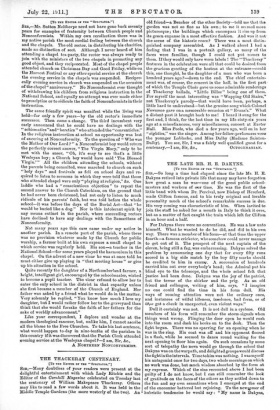[TO THE EDITOR Or THE "SPECTATOR:1
Sis,—Mr. Sutton Nelthorpe need not have gone back seventy years for examples of fraternity between Church people and Nonconformists. Within my own recollection there was in my native parish the most cordial feeling between the church and the chapels. The old rector, in distributing his charities, made no distinction of sect. Although I never heard of him attending a chapel tea-party, the rector was always ready to join with the ministers of the two chapels in promoting any good object, and they reciprocated. Most of the chapel people attended church on Christmas Day and Good Friday, while on the Harvest Festival or any other special service at the church the evening service in the chapels was suspended. Recipro- cally evening service in church was suspended on the occasion of the chapel" anniversary." No Nonconformist ever thought of withdrawing his children from religious instruction in the National School, and equally no attempt was ever made either to proselytize or to ridicule the faith of Nonconformists in their instruction.
The same friendly spirit was manifest while the living was held—for only a few years—by the old rector's immediate successor. Then came a change. The third incumbent very early announced that he could have no dealings with the " schismatics" and " heretics " who attended the "conventicles." In the religious instruction at school no opportunity was lost of steering at Nonconformity. To the question of "Who was the Mother of Our Lord ? " a Nonconformist boy would return the perfectly correct answer, "The Virgin Mary," only to be met with the sneer, "Oh, it's easy to see that's a little Wesleyan boy; a Church boy would have said 'The Blessed Virgin.' " All the children attending the schools, without the parents being consulted, were marched to church on such "holy days" and festivals as fell on school days and re- quired to listen to sermons in which they were told that those who attended chapel were only "playing at religion," &c. One laddie who had a "conscientious objection" to repeat the second answer to the Church Catechism, on the ground that he had never been christened, had not only to listen to much ridicule of his parents' faith, but was told before the whole school—it was before the days of the Burial Act—that "be would be buried like a dog." Nor is this intolerant spirit by any means extinct in the parish, where succeeding rectors have declined to have any dealings with the Samaritans of Nonconformity. - Not many years ago this case came under my notice in another parish. In a remote part of the parish, where there was no provision whatever made by the Church for public worship, a farmer built at his own expense a small chapel in which service was regularly held. His son—a teacher in the National School—for some years played the harmonium in this chapel. On the advent of a new vicar he was at once told he must either give up playing in "that meeting house" or give up his situation in the school.
Quite recently the daughter of a Northumberland farmer, a bright, intelligent girl, encouraged by the schoolmaster, wished to become a pupil teacher. The vicar refused to allow her to enter the only school in the district in that capacity unless she first became a member of the Church of England. Her father was asked by a friend what he would do in the matter. Very solemnly he replied, "You know how much I love my daughter, but I would rather follow her to the graveyard than think that she would forsake the faith of her fathers for the sake of worldly advancement."
Like your correspondent, I deplore and wonder at the modern theological rancour, but, unlike him, I cannot ascribe all the blame to the Free Churches. To take his last sentence, what would happen to-day in nine-tenths of the parishes in this country if it was discovered that the Parish Clerk attended evening service at the Wesleyan chapel P—I am, Sir, &c., A NORTHERN NONCONFORMIST.






































 Previous page
Previous page